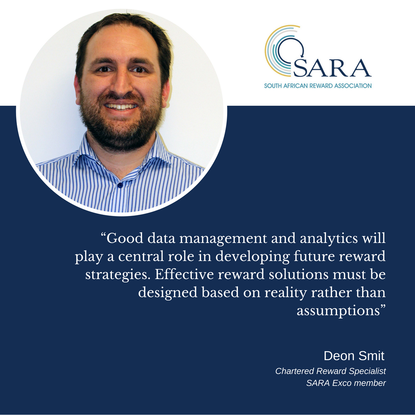|
Companies usually base how they pay and reward their employees on financial data. Deon Smit, Chartered Reward Specialist and Executive Committee Member at the South African Reward Association (SARA), says that corporate communications like emails or instant messages, social media posts and many other data sources should be used to provide deeper insights.
These insights can help to keep financial and non-financial elements of remuneration relevant to what employees need as motivation. “Good data management and analytics will play a central role in developing future reward strategies. Effective reward solutions must be designed based on reality rather than assumptions,” says Smit. “Reward practitioners must start taking responsibility to gather the right information and develop the ability to draw valid conclusions from the data available.” Smit offers the following practical guidance: Start with a purpose It’s important to decide what business problems should be solved first and what data is best suited to that purpose. “Tackle the simple business problems first and build up to the big ones,” advises Smit. “This will help you get your data and your process right at each discrete level of growing complexity.” HR and people data will be central to efforts, but strategic, financial, and corporate communications data will also play an important role. Be a visionary For most problems, a large set of historical data is needed to facilitate predictive analysis and produce accurate results. “You have to decide what you want to measure in 6 months from now, build the datasets and make sure the data is accurately captured,” says Smit. “Only after that period will you have enough to work with.” Clean up “One of the first mistakes companies make is to start with incomplete, incompatible or mismatched data,” reports Smit. The data collection methodology employed must be consistent to ensure there are no information gaps that could produce misleading results. Learn Reward practitioners should understand how datasets are constructed, how relational databases work and how unstructured data found in emails, social posts and other digital sources can be collected. They also need to evolve past Excel and embrace programming languages like R (a statistical language), Python (a general programming language) or SQL (a database query language). In addition, business intelligence and data analysis skills are essential. This may seem unnecessary for reward programmes but Smit foresees that these competencies will be in demand in the future. “HR will start hiring data specialists over people specialists because data will become the key to understanding workforce behaviours and motivators,” says Smit. He suggests that practitioners become self-educated to increase their value. Universities now offer numerous free courses on these subjects through MOOC (massive open online courses) platforms. Don’t forget qualitative inputs Although quantitative analysis - mathematical and statistical modelling - is critical, reward specialists should not overlook qualitative analysis - the study of observable behaviour or structure. “Don’t become too focused on the numbers,” recommends Smit. “They need to be viewed in conjunction with phenomena like group dynamics, behavioural psychology, generational concerns, cultural norms and other non-numerical inputs.” Start over Data analysis must always solve a business problem. Once the collected information has been studied and understood, reward specialists can develop innovative solutions and drive their implementation forward. Smit concludes: “After a solution has been found, the cycle will start over so that another – more complex – business problem can be targeted.” ENDS MEDIA CONTACT: Juanita Vorster, 079 523 8374, [email protected], www.atthatpoint.co.za For more information on SARA please visit: Website: www.sara.co.za Twitter: @SA_reward LinkedIn: South African Reward Association Facebook: SARA – South African Reward Association
0 Comments
|
Archives
March 2023
Welcome to the South African Reward Association newsroom.
Categories
All
|


 RSS Feed
RSS Feed